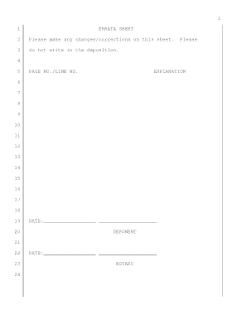How many times have litigators said "the witness will read and sign the transcript" at the end of a deposition? But to what extent can a witness actually correct their testimony on an errata sheet?
In a recent decision, Judge Urbanski addressed the scope of the provision in the Federal Rule of Civil Procedure allowing for the reading, correction and signing of a deposition transcript.
This contract dispute involved ant-infested wooden pallets manufactured by plaintiff and sold to defendant. The case was before the court on plaintiff's summary judgment motion and objection to defendant's errata sheets purporting to change the testimony of defendant's witnesses (including its 30(b)(6) witness) which were provided to plaintiff only days before the deadline to file dispositive motions.
Rule 30(e) provides that after a deposition transcript is prepared, the deponent is allowed 30 days "to review the transcript ... [and] if there are changes in form or substance, to sign a statement listing the changes and the reasons for making them." This statement containing those changes is referred to as an "errata sheet."
As noted by Judge Urbanski, courts uniformly allow deponents to make minor form changes and corrections to transcription errors, but the Fourth Circuit has not addressed the outer scope of Rule 30(e) and thus there is a difference of opinion among lower courts regarding the ability to make more substantive changes to deposition testimony.
While the Court noted that there were two general lines of cases--the "traditional" and "modern" approach to Rule 30(e)--, the Court decided instead to adopt the "case-by-case approach" developed by the Third Circuit.
Under the traditional approach, deponents can made substantive--even contradictory--changes to prior testimony. This permissive approach allows almost any change in an errata sheet, although both versions remain available for purposes of cross-examination.
In contrast, the modern approach interprets Rule 30(e) more narrowly and only allows for corrections for errors made by the court reporter. One case, cited by the Court, explained that "[t]he Rule cannot be interpreted to allow one to alter what was said under oath. If that were the case, one could merely answer the question with no thought at all, then return home and plan artful responses.... A deposition is not a take home examination." (quoting
Trout v. First Energy Generation Corp., 339 F. App/x 560, 565 (6th Cir. 2009)).
After explaining these two approaches, Judge Urbanksi determined that the Court need not adopt either the permissive traditional approach or the narrow modern approach, because there was a third approach that best addresses the situation before the Court.
As explained by the Court, the Third Circuit's more flexible case-by-case approach "allows deponents to make necessary changes via Rule 30(e) without also 'generat[ing] from whole cloth a genuine issue of material fact (or eliminate[ing] the same) simply by re-tailoring sworn deposition testimony to his or her satisfaction.'" (quoting
EBC Inc. v. Clark Bldg. Sys. Inc., 618 F.3d 258, 268 (3d Cir. 2010)).
The case-by-case approach is similar to the "sham affidavit" doctrine, which prevents a party from avoiding summary judgment by submitting an affidavit that contradicts prior testimony. Similarly, under the Third Circuit's flexible approach to Rule 30(e), "the court has discretion to ignore errata sheets that propose 'substantive changes that materially contradict prior deposition testimony, if the party proffering the changes fails to provide sufficient justification.'" Given that the Fourth Circuit has recognized the "sham affidavit" doctrine, Judge Urbanski reasoned that "the Third Circuit's case-by-case approach to Rule 30(e) best accounts for the facts presented here."
Applying this case-by-case approach, the Court determined that defendant's errata sheets should be ignored because they directly contradicted prior testimony, were submitted only days before the deadline for summary judgment motions, were supported by only perfunctory justifications and were focused on the very issues at stake in the summary judgment motion. Thus, the Court held that "[a]bsent a more compelling justification for the abrupt change in testimony, the court will not allow [defendant] to use Rule 30(e) to inject new factual disputes into the summary judgment record that did not exist previously."
The Court went on to grant in part and deny in part the summary judgment motion, and reserved judgment on whether the errata sheet should be stricken for purposes of trial. The Court concluded:
Further, as noted above, the court need not resolve the larger dispute about the proper scope of Rule 30(e) that has thus far divided courts in this circuit. In the situation presented here-where a party changes sworn testimony directly relevant to its potential liability mere days before the deadline for dispositive motions-the court is persuaded that Rule 30(e) does not allow parties to make substantive changes to deposition testimony in an effort to avoid an imminent motion for summary judgment.
Until the Fourth Circuit addresses the issue, Judge Urbanski's opinion will likely be cited in subsequent civil litigation to delineate the scope of errata sheets under Rule 30(e). The Court's full opinion in
Grottoes Pallet Company, Inc. v. Graham Packaging Plastic Products, Inc., 2016 WL 93869 (Jan. 7, 2016) is available
here.
Labels: changes, civil litigation, Civil Procedure, contract dispute, deposition, errata sheet, fourth circuit, Rule 30(e), Rules, sham affidavit, summary judgment, transcript





